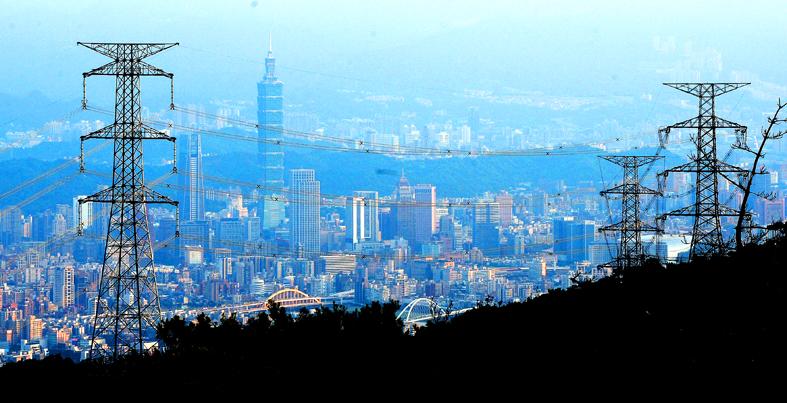Taiwan might be heading into another record summer of electricity use, Taiwan Power Co (Taipower, 台電) said yesterday.
First-quarter electricity use increased 3 percent year-on-year, with the last three days of last month breaking record peak use for March, the state-run utility said.
So far this month, power use is up 7 percent year-on-year. The most power used this month was on Thursday last week when 32.765 gigawatts (GW) were used in a day, up from the previous April record of 29.99GW.

Photo: Lin Cheng-kun, Taipei Times
The all-time record for single-day electricity use was set on July 23 last year, when usage reached 38.02GW.
“We expect that record to be broken this year,” Taipower manager Chang Ting-shu (張廷抒) said.
Taipower said that it was caught by surprise by how power use has been growing ahead of expectations, even before the arrival of the summer heat.
Increased domestic demand might have been caused by the stable economy, it added.
Taiwan’s electricity usage has increased year-on-year every year in the past few years, growing more than 2 percent last year.
Electricity generation capacity might also be strained by the water shortage, which has reduced first quarter hydroelectric power generation 16 percent year-on-year, Taipower said.
Chang said that he is still “confident” that Taipower will have the 10 percent reserve capacity necessary to handle summer peak demand, but it absolutely cannot do it without the four coal-fired generators in Taichung.
Taichung Mayor Lu Shiow-yen (盧秀燕) is blocking construction of two liquified natural gas (LNG) generators pending the decommissioning of the four coal-fired generators.
Chang said that delaying the construction of the new LNG generators would only delay the decommissioning of the older coal-fired generators.
“Mayor Lu is holding the construction of the new LNG generators hostage, but we cannot shut off the coal generators without creating a potential power crisis,” Chang said.
The new LNG plants would take five years to construct, he added.

Zhang Yazhou was sitting in the passenger seat of her Tesla Model 3 when she said she heard her father’s panicked voice: The brakes do not work. Approaching a red light, her father swerved around two cars before plowing into a sport utility vehicle and a sedan, and crashing into a large concrete barrier. Stunned, Zhang gazed at the deflating airbag in front of her. She could never have imagined what was to come: Tesla Inc sued her for defamation for complaining publicly about the vehicles brakes — and won. A Chinese court ordered Zhang to pay more than US$23,000 in

Taiwan Semiconductor Manufacturing Co (TSMC, 台積電) yesterday held its first board of directors meeting in the US, at which it did not unveil any new US investments despite mounting tariff threats from US President Donald Trump. Trump has threatened to impose 100 percent tariffs on Taiwan-made chips, prompting market speculation that TSMC might consider boosting its chip capacity in the US or ramping up production of advanced chips such as those using a 2-nanometer technology process at its Arizona fabs ahead of schedule. Speculation also swirled that the chipmaker might consider building its own advanced packaging capacity in the US as part

Taiwan Semiconductor Manufacturing Co (TSMC, 台積電) yesterday said that its investment plan in Arizona is going according to schedule, following a local media report claiming that the company is planning to break ground on its third wafer fab in the US in June. In a statement, TSMC said it does not comment on market speculation, but that its investments in Arizona are proceeding well. TSMC is investing more than US$65 billion in Arizona to build three advanced wafer fabs. The first one has started production using the 4-nanometer (nm) process, while the second one would start mass production using the

US President Donald Trump has threatened to impose up to 100 percent tariffs on Taiwan’s semiconductor exports to the US to encourage chip manufacturers to move their production facilities to the US, but experts are questioning his strategy, warning it could harm industries on both sides. “I’m very confused and surprised that the Trump administration would try and do this,” Bob O’Donnell, chief analyst and founder of TECHnalysis Research in California, said in an interview with the Central News Agency on Wednesday. “It seems to reflect the fact that they don’t understand how the semiconductor industry really works,” O’Donnell said. Economic sanctions would